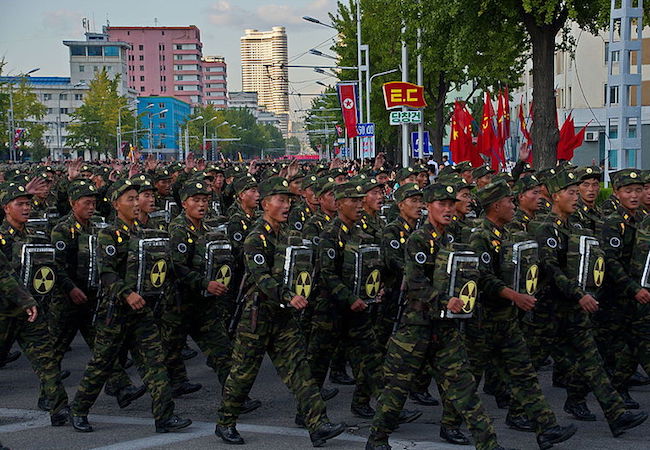
By Kristin Y. Christman
Americans are instructed that North Korea is an aggressor that violates international agreements and doesn’t negotiate. Until North Korea denuclearizes, we are told, the U.S. must continue rejecting its peace proposals.
After all, North Korea withdrew in 2003 from the 1968 Treaty on the Non-Proliferation of Nuclear Weapons (NPT). Its subsequent nuclear and missile testing violate the 1953 Korean War armistice agreement and 1994 Agreed Framework, by which North Korea agreed to end its nuclear weapons program. It all sounds so principled and practical until you realize we’re getting only half the story. And if you paint a one-sided story, you’ll never get a two-sided solution.
Let’s talk about violations. Paragraph 13d of the armistice prohibits introducing new types of weaponry into the Korean peninsula. By 1958, the U.S. had begun violating the agreement by rolling in Honest John atomic rockets and atomic cannons into South Korea. Within a year, atomic demolition mines and nuclear-armed Matador cruise missiles were installed. U.S. helicopters routinely flew nuclear weapons near the DMZ. By the 1960s, the U.S. had deployed nearly 950 nuclear weapons to South Korea.
In wild violation of the armistice and the non-proliferation treaty, the U.S. made early use of nuclear weapons in future conflict the bedrock strategy against North Korea. Why? Because North Korea didn’t have nukes to fight back. And because it was cheaper to deploy nukes rather than troops.
How did U.S. nukes escape surveillance by the international inspection teams charged with enforcing weaponry limits laid out in the armistice? When the U.N. Command couldn’t persuade North Korea to mutually abrogate paragraph 13d, President Dwight Eisenhower had the inspection teams evicted from the Koreas by cooking up evidence against them. Then, alleging that North Korea was violating paragraph 13d, the U.S.-dominated U.N. Command indicated it would no longer be bound by it — and in poured U.S. nukes.
North Korea condemned 13d’s abrogation as an attempt to destroy the armistice and turn South Korea into a U.S. nuclear warfare base. U.S. policymakers don’t trust North Korea. But on what basis can North Korea trust the U.S.? What agreement with North Korea has the U.S. ever not violated?
In 1991 President George W. Bush withdrew nukes from South Korea because precision-guided conventional weapons became more useful. The U.S. nuclear umbrella remained, and the U.S. further trampled the armistice terms by supporting South Korea’s ballistic missiles, deploying Patriot missiles and installing an anti-missile defense system.
Whichever agreement is under discussion, the same behavior is seen: the U.S. never sees its own violations as wrong. Those supporting the controversial U.S./South Korea Key Resolve nuclear war simulations insist that deterring a North Korean invasion requires U.S./South Korea forces to be able to rapidly destroy the North Korean military before it inflicts much damage. Yet such inequality in military strength provokes fear, not peace.
Step into North Korea’s shoes. Kim Jong Un maintains that a U.S./South Korea invasion can best be deterred if North Korea has a strong military capacity that can bite back. The U.S. has a history of invading and deposing leaders in militarily weaker nations, including Iraq, Afghanistan, Iran, Congo, Chile, Guatemala, etc. So what’s so crazy about North Korea trying to deter another U.S. invasion?
And how can North Korea be expected to disarm when there’s talk of toppling Kim and U.S./South Korea war games may be cover for an invasion? Yes, the Kim dynasty has behaved abominably towards North Koreans, but its cruelty doesn’t prove that North Korea’s grievances are unjustified. To what extent has North Korea’s fear of invasion or political assassination aggravated internal tensions?
A cooperative negotiated agreement must address not only U.S. grievances but North Korea’s needs for survival, sovereignty, a Korean War peace treaty, mutual nuclear disarmament, food, access to energy — including the 23-years-delayed light water reactors, economic development and diplomatic relations. Any agreement to “open up North Korea” must ensure that North Koreans don’t become a cheap labor force for foreign profiteers, that North Korea’s natural resources aren’t appropriated by foreigners and that Korean identity and values are not upended by Western consumerism, individualism and hectic living.
South Korean grievances against North Korea and the U.S. should be addressed, including fear that South Korea’s government represents the U.S. government more than South Koreans, many of whom have protested U.S. military bases, South Korea’s troop deployment to Iraq, weapons systems and nuclear war simulations.
Lastly, the agreement must include training and monitoring of human rights, for North Korea’s government must treat its people with the kindness and truthfulness with which it would like to be treated by the world. Experts know that cooperative negotiated agreements endure, not power-based negotiation in which one side forces a deal upon the other using “diplomatic” pressure, preconditions, and sanctions.
Consider the Cuban missile crisis. We’re taught to admire President Kennedy for his brinkmanship and nuclear war threat that allegedly cowed Soviet Premier Khrushchev into scuttling back home with his missiles. But actually, in a secret deal, Kennedy agreed to remove U.S. Jupiter missiles in Turkey and Italy in exchange for Soviet removal of missiles in Cuba. Plus, the U.S. promised not to invade Cuba.
It wasn’t the threat that worked. It was the reduction of both sides’ fears.
* This article was first published in the Albany Times Union and is being republished at the author’s request.




